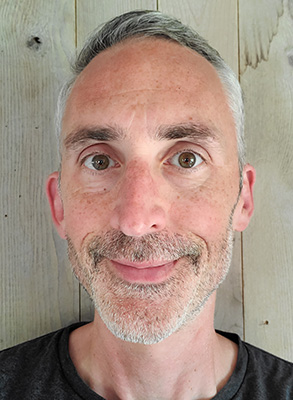
Four months ago, on April 5th, 2021, I gave up alcohol to see what the impact would be on my sleep, as well as my overall well-being.
I also did my best to give up added sugar, which is a trickier beast to master because it hides in all kinds of food and drink, like a sweet little chameleon.
I previously wrote about the first month, and this is part two (it’s a standalone article, so it’s not necessary to read part one if you don’t have time).
I wasn’t sure if I’d make it as far as four months, but I got through it with my somewhat eccentric enjoyment of willpower tests. It also helped that the initial month was a positive experience after the initial discomfort of sugar withdrawal subsided.
So it means I have a lot more sleep tracker data to talk about, and more personal observations too.
I also have a new question that I’m thinking about a lot at the moment: what would it take to consistently sleep even better? In other words, how much more am I willing to do in the name of experimentation and good sleep?
Before I answer those questions, let’s first take a look at my Fitbit data for the last three months to see what happened with my sleep.
Months 2, 3, and 4 after quitting alcohol and sugar
1. Average sleep per night
The table below shows the average sleep per night during months two, three and four of my experiment.
| Dates | Average sleep per night |
|---|---|
| May 6 – May 8 | 7 hrs 8 mins |
| May 9 – May 15 | 6 hrs 29 mins |
| May 16 – May 22 | 6 hrs 55 mins |
| May 23 – May 29 | 6 hrs 40 mins |
| May 30 – Jun 5 | 6 hrs 24 mins |
| Jun 6 – Jun 12 | 6 hrs 40 mins |
| Jun 13 – Jun 19 | 7 hrs 2 mins |
| Jun 20 – Jun 26 | 7 hrs 2 mins |
| Jun 27 – Jul 3 (Had COVID-19) | 7 hrs 2 mins |
| Jul 4 – Jul 10 | 7 hrs 25 mins |
| Jul 11 – Jul 17 | 7 hrs 21 mins |
| Jul 18 – Jul 24 (Heatwave) | 6 hrs 9 mins |
| Jul 25 – Jul 31 | 6 hrs 44 mins |
| Aug 1 – Aug 5 | 7 hrs 18 mins |
| Average | 6 hrs 53 mins |
The average amount of sleep I got per night for the last three months is still under seven hours then, at 6 hrs 53 mins.
Now let’s compare it with my sleep in part one of the experiment:
- The two weeks before quitting: 6 hrs 32 mins.
- The first month after quitting: 6 hrs 44 mins.
- Months two, three and four: 6 hrs 53 mins.
That looks to me to be an improvement: nine minutes more sleep per night compared to the first month; 21 minutes more per night than the two weeks before quitting.
It’s also interesting that the week with the least sleep was recorded during an unpleasant heatwave. I really struggled to sleep that week, so I’m not surprised at all that the average dropped to a measly six hours and nine minutes.
Below you can see a week in which my sleep varied a lot. There are five good nights, but they are counterbalanced by two nights with not enough sleep.
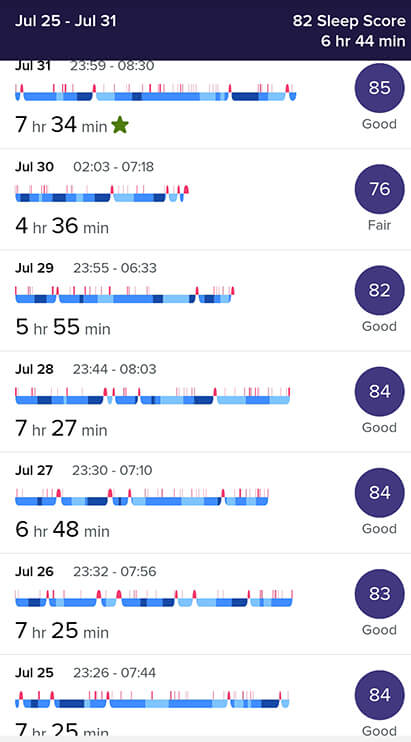
2. Fitbit sleep score
I know I shouldn’t see the Fitbit sleep score as a ‘success’ or ‘failure’. I do feel happy when I hit 90 in a night though, which is very rare. It’s happened just five times in the whole of the last year!
And in all the years I’ve been using different Fitbits, I don’t think there has ever been a week in which the overall average was 90 or more.
Perhaps I feel so pleased on the mornings following 90 nights because I slept so well and just feel good anyway.
Here are my sleep scores for the last three months:
| Dates | Sleep Score |
|---|---|
| May 6 – May 8 | 80 |
| May 9 – May 15 | 80 |
| May 16 – May 22 | 82 |
| May 23 – May 29 | 79 |
| May 30 – Jun 5 | 81 |
| Jun 6 – Jun 12 | 80 |
| Jun 13 – Jun 19 | 80 |
| Jun 20 – Jun 26 | 83 |
| Jun 27 – Jul 3 (Had COVID-19) | 80 |
| Jul 4 – Jul 10 | 83 |
| Jul 11 – Jul 17 | 82 |
| Jul 18 – Jul 24 (Heatwave) | 76 |
| Jul 25 – Jul 31 | 82 |
| Aug 1 – Aug 5 | 82 |
| Average | 81 |
Again, let’s compare that average of 81 for the last three months with the previous results:
- The two weeks before quitting: 79
- The first month after quitting: 82
- Months two, three and four: 81
This came as a surprise because I feel like my sleep has been getting better recently. Even if I take out the worst week with a score of 76 when there was an unusual heatwave, it still rounds up to an average of 81.
81 is better than 79 in the two weeks before I quit. Still, I can’t deny I’m a little disappointed the score is lower than the first month. What more do I need to do to get a higher score?
3. Restless time
The Fitbit app doesn’t provide convenient weekly averages for the restless times, so I had to calculate it manually on a day by day basis. To save time, I’ve decided not to include a table for this measure.
The average time I spent restless during this period was 8.4%. Let’s compare it to the first two time periods again:
- The two weeks before quitting: 7.9%
- The first month after quitting: 7.1%
- Months two, three and four: 8.4%
It’s another surprise – in the wrong direction. The percentage of time I spent restless went up compared to both the first month and the time before quitting.
When I looked more closely at the data for the time periods in which I was most unwell with COVID-19 and the heatwave, the restless time was increased in both. However, even when I took those two weeks out to see how much impact they had on the overall average, it worked out at 8.2%, which is still more restless time than the previous results.
This result surprised me in particular because I feel like I’ve been sleeping right through the night more often than before.
So what’s going on? Is the tracker measuring something I’m not consciously aware of? Is my subjective view of my sleep too positive? Is the tracker inaccurate?
Perhaps I just have too much energy with my new healthy lifestyle and I’m not burning enough off each day.
It’s a bit of a mystery.
4. Resting heart rate
One of the clearer results from the initial month’s experiment was an improvement in resting heart rate.
I again took the daily average for the last three months, and it came out at 55.8. Here are the three time periods compared:
- The two weeks before quitting: 60
- The first month after quitting: 57.8
- Months two, three and four: 55.8
I’m happy to see a further improvement in my resting heart rate over the last three months. It didn’t get to 60 on a single day either, which is good to see.
However, I’ve had a shoulder injury for the last month, which has stopped me from doing a lot of my usual gym training. I can see in the app data that my resting heart rate has been steadily rising again, and the average for the last two weeks is back up to 57.
If I continue the experiment for more months, I’ll have to be mindful of that and put more effort into other forms of cardio to keep my fitness up.
Here you can see that my resting heart rate dropped significantly when I first quit alcohol and sugar, but has crept back up again in the last few months:
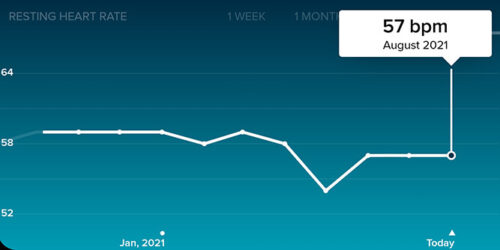
5. Sleep stages
I decided not to calculate the average time spent in each sleep stage this time, mainly because of my concerns about how reliable the data is.
It’s no secret that consumer sleep trackers are consistently shown in research to lack accuracy when compared with the gold standard of a polysomnogram conducted by professionals working in the sleep field.
At least with the total time spent asleep, the sleep score, percentage of restless time, and resting heart rate I have some crude ways to judge how reasonable the results seem. They might not be 100% accurate either, but at least I can generally tell if they seem like reasonable and useful estimates or are very wrong.
For example, if the app starts giving me sleep scores of 60 when I know I’m sleeping well, or 90 when I hardly sleep at all, I’ll know something is wrong. I can then either write about it and/or consider using a different tracker.
I also keep a manual record of the time I turn the bedside light off to go to sleep, and also wake up. It’s important to know if a sleep tracker is mistakenly recording relaxation or reading time in bed as light sleep time, as this quickly destroys people’s confidence in a sleep tracker. Fortunately, my Fitbit Versa 3 seems capable of telling the difference (most of the time).
With the sleep stages, however, I have no way of even guessing whether I spent a certain amount of time in deep, REM, or light sleep. It’s just impossible.
So for now, I’m going to focus on the sleep tracking data I have more confidence in – the data I’ve covered so far in this article.
Going back further: the entire year before
In part one of my experiment, I compared the two weeks before quitting with the first month after, which isn’t a very long time period. So out of interest, I decided to work out some averages for the entire previous year.
It’s important to note that I changed my sleep tracker shortly before I began the experiment, which is a key reason I initially only included the two weeks before I quit. I also moved house and country, so there was a major life change.
The change in tracker was from a Fitbit Versa 2 to a Fitbit Versa 3, so at least it’s a similar device (I think) rather than a completely different manufacturer and style of tracker. Even if I had used the same tracker for the whole period, moving country would have been enough for me to take this comparison with a grain of salt.
Here is the average amount of sleep time per night for the year before and the four months after quitting:
| Average sleep per night | |
|---|---|
| Jan – Mar (2021) | 6 hrs 48 mins |
| Oct – Dec (2020) | 7 hrs 02 mins |
| Jul – Sep (2020) | 6 hrs 52 mins |
| Apr – Jun (2020) | 6 hrs 48 mins |
| Average for the year before | 6 hrs 52 mins |
| First month after quitting | 6 hrs 44 mins |
| Months 2-4 after quitting | 6 hrs 53 mins |
And here you can see the sleep score for the year before and the four months after quitting:
| Average Sleep score | |
|---|---|
| Jan – Mar (2021) | 81 |
| Oct – Dec (2020) | 82 |
| Jul – Sep (2020) | 81 |
| Apr – Jun (2020) | 79 |
| Average for the year before | 81 |
| First month after quitting | 82 |
| Months 2-4 after quitting | 81 |
If I didn’t have the caveat of using a different sleep tracker and moving country last year, I might be eating a giant slice of cake right now!
I don’t think one extra minute of sleep is significant, and 81 is hardly an improvement on 81. The sleep scores are rounded up or down accordingly, so there’s a chance there could be a small difference. I have no way of knowing though, and it would still be too small a difference for me to draw any conclusions anyway.
However, I don’t think it’s hugely useful to compare the data considering the change in variables of the tracker used and the country I was in, along with all the other life circumstances that naturally differ from one country to the next, such as climate, diet and the bed slept on.
Having said that, I can’t deny that it’s curious to see an identical average sleep score, and just one minute difference in the average sleep times.
Did quitting alcohol and sugar make no difference to my sleep at all? Did the change in country worsen my sleep, but it was brought back up to the same level by the dietary changes? Is the new sleep tracker more or less conservative in measuring sleep?
I can’t answer those questions at the moment, which is why I think it might turn out to be more useful to observe what happens to my sleep the longer I do this experiment. I plan on using the same tracker for some time to come, and staying in the same country, so those variables will be controlled going forward.
This, of course, will only be possible if I continue to use myself as a human guinea pig and am willing to continue life without cake, beer, or whatever else comes next…
How I actually feel about my sleep and well-being now
If you search online for the ‘benefits of quitting alcohol’ or ‘benefits of giving up sugar’ it’s not long before ‘better sleep’ comes up. Partly because there is scientific research for it – especially alcohol. And partly because many bloggers, journalists, and people in forums, etc anecdotally report it as one of the benefits.
Despite what my sleep tracker might say, I feel like my sleep has been improving on the whole. And how you feel you sleep is arguably more important than what a sleep tracker tells you. So I would also add my anecdotal support for the idea that giving up alcohol and/or sugar is good for your sleep.
However, it’s not yet as consistently good as I’d like it to be. There are still nights when I struggle to fall asleep and I regularly wake up earlier than I’d like to – once I’m up, I’m up.
Still, I’ve had four months without even a hint of a hangover, rarely need to go to the bathroom more than once in the night, and I’ve had zero very late nights drinking with family or friends socially. Those things alone would give me cause to believe my sleep should be better.
Importantly, I feel great most days. I have tons of energy, no energy crashes during the day, feel upbeat most of the time and have fantastic focus when I’m working. I’m not sure I would feel that way if I was regularly sleeping badly.
I’m absolutely certain that life without alcohol or sugar has been good for me, and just gets better and better as time goes by.
Yes, there are times when it’s difficult. My four year old nephew’s recent birthday party was tough as the smell of cake, chocolate, and sweets was intense! My sister’s birthday was also tricky to navigate, though some decent low-sugar alcohol-free beer helped a lot.
Those are socially important, but fleeting moments of difficulty though. The rest of my days have far less temptation, and the benefits of being so strict with my lifestyle choices far outweigh the short-lived pleasure of a beer or a slice of cake.
Along with the improvement in my energy levels, concentration, and mood, there have been numerous physical benefits: my skin feels many years younger than it was; both my skin and eyes are glowing; my digestion is much better than it has been in years; I’ve had no mouth ulcers in four months (I used to get them very regularly); I feel more flexible when I do yoga; I almost never have a headache, and the list of positive effects goes on.
So I think I’m up for continuing without alcohol or sugar for even longer, and maybe adding a few more changes to see if I can improve my sleep in other ways.
All is not lost – here’s my first successful attempt at baking a sugar-free cake (that actually tasted good):
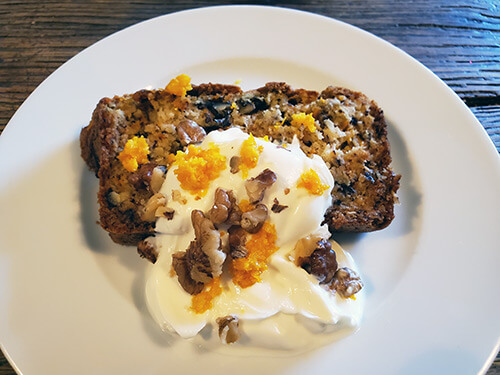
New plans for months five to eight
I’ve been thinking a lot in the last few days about the results of the experiment so far, and a question keeps buzzing around my head.
What if my current obsession with quitting alcohol and sugar has blinded me to other important factors affecting my sleep? Am I missing a crucial variable that’s preventing me from getting seven hours of sleep, or that mythical sleep score of 90?
As I said in part one, I didn’t quit alcohol because I felt like I had a problem with it; I was a moderate drinker. I did eat a lot of sugar, but I’m sure many people eat considerably more and my diet is generally very healthy. Perhaps alcohol and/or sugar weren’t affecting my sleep as much as I thought.
So what else do I do, or not do, that I should know as a sleep blogger is important for your sleep?
An obvious lifestyle choice that comes to mind is my caffeine consumption. I drink quite a lot of tea and coffee earlier in the day, and sometimes in the afternoon too. I never drink caffeinated drinks after around 5 p.m., but it’s possible the amount I drink before that cut-off point is still too much.
So, I’m going to commit to changing my caffeine habit for the next four months, in two phases:
- Months five and six: no caffeine after midday.
- Months seven and eight: no caffeine at all.
I can’t say I’m looking forward to months seven and eight, but hopefully the inevitable withdrawal will be made less painful by cutting down in months five and six!
Once I do that, I will have literally no vices. No drugs, no smoking, no medication, no alcohol, no caffeine, no sugar.
No fun either, some might say.
They’d be wrong though. I find more fun in the things I do now, not in the things I consume. And considering the state of the planet right now, I think that’s a positive approach to take to life. It’s just not easy, as much as I wish it were.
Fitbit’s own advice on improving sleep scores
As I said earlier, I know you need to be careful how much you judge your sleep based on sleep tracker sleep scores. It’s not a competition, and I don’t think it’s helpful if it stresses you out when you get lower sleep scores.
That said, I feel okay with chasing higher scores at the moment because I’m doing some self-experimentation, and I’m also curious to know how much you can change your sleep score over time.
To get some new ideas, I took a look at the advice on the Fitbit website for improving your sleep score.
This is what Fitbit says:
To help improve your sleep score, work on your overall sleep habits, heart health, and activity levels:
Fitbit website
- Exercise earlier in the day or at least 3 to 4 hours before you go to sleep.
- Maintain a consistent sleep schedule.
- Meet the CDC’s recommended 150 active minutes per week.
I definitely tick the boxes for the first and third points. I’m not so good with the second point though, for a couple of reasons.
Firstly, I work from home and don’t typically set an alarm. I’m used to waking up between 7 a.m. and 7.30 a.m. naturally. Perhaps a specific time would be better.
More importantly, I haven’t been consistent with the time I try to fall asleep in recent months. I usually go to bed some time between 10 p.m. and 11 p.m., but I might read in bed for an hour or two. There is no pattern – I just read until I’m bored, tired or both.
I also sometimes use my phone in bed. I had stopped doing that, but started again during the pandemic as I wanted to check the news at the end of the day. That’s definitely not ideal, as the news can be stressful, and I often end up using my phone for even longer because, well, social media exists.
Reverse engineering the 90 sleep score nights
Here you can see three of the five nights in which I got a sleep score of 90 or more:
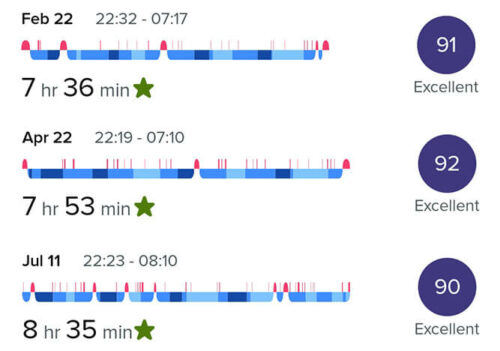
After checking the Fitbit website, I took a closer look at the five nights in the last year when I got a sleep score of 90 or more (the highest score was 92).
Just five nights out of 365!
Interestingly, all five showed that I fell asleep between 10:30 p.m. and 11 p.m. And on four of those five nights, the time was between 10:30 p.m. and 10:40 p.m. I slept for more than seven hours on all five nights too, which is longer than my average for the last 16 months.
The only other thing all five days had in common, that the tracker can record, was a fast enough walk to be tracked as exercise – of at least 20 minutes in every case. I didn’t do any other trackable exercise on two of those days, so it was just the brisk walk outdoors that I seem to have done on all five days.
It might not seem like much information, but it’s something. And I can see how both of these points could be positive for my sleep.
I find walking very relaxing and great for my mental health. And going to bed earlier, combined with more control over how I use my phone, can only be good I think.
So as well as caffeine control, here are four more action points for the next four months that I’ve decided to try:
- Go for a 20 minute relaxing walk every day, even if I do other exercise that day.
- Turn the light off to go to sleep between 10:30 p.m. and 11 p.m. as often as possible.
- Set an alarm for 7 a.m. every morning.
- Don’t use my phone in bed. Books only.
Summary
I almost wish I hadn’t looked at last year’s sleep data. Even though I know the comparison is deeply flawed because I changed sleep tracker and moved country, the fact that the results are virtually identical has put some doubt in my mind.
When you turn down offers of a cold beer or homemade chocolate cake for months on end, doubt is not your friend.
On a more positive note, I was pleased to see that I got more average nightly sleep in the last three months than the first month of the experiment, and even more than the two weeks before I started. And it’s good to see a continued improvement in my resting heart rate.
The increase in time spent restless and the drop in the sleep score were a surprise. I have plans to tackle those though, and it will be interesting to see if I’m right about other factors playing a role in my sleep.
So here we go – another four months without alcohol and sugar, along with some adjustments to my caffeine intake and sleep schedule.
My personal belief is that being much more careful with how I spend the last couple of hours of the day could play a pivotal role in how well I sleep. My gut feeling is that I slipped into some sleep-stealing bad habits during the pandemic (understandably). If I can get those under control, I think I can improve my sleep.
My definition of improve? Well, I know I usually feel at my best when I get a good seven hours of sleep or more. So I’d like to see my average nightly sleep creep over seven hours.
As for the sleep score, I’m less worried about that as I don’t know all the details of how the algorithm works anyway. So that point is more just for interest; if I can increase the score past 82, I’ll be pleased, but I won’t let it stress me out if it doesn’t happen.
At the end of the day, how I feel I’m sleeping is much more important to me than what a Fitbit reports. And I feel like I’ve been sleeping better, on average, since I quit alcohol and sugar. So I’ll be keeping a close eye on my subjective experience of my sleep, and how I feel during the day.
The last four months haven’t exactly been easy, but it’s been an interesting and positive journey in many ways.
I have no idea how the next four months will go, and if I’m pushing the limits of my willpower and how much self-control I can tolerate. Whatever the case, it will doubtless continue to be interesting.
Wish me luck!
How do you sleep?
If you read this very long article (thanks!), I imagine you either have an interest in sleep trackers, alcohol, sugar, or strange people who put themselves through the torture of abstaining from cake!
So I’d love to know which it is for you, and if you can relate to anything in my journey. And if you also use a sleep tracker, how do you feel about the data it gives you? Is it helpful or stressful?
Let me know in the comments below.
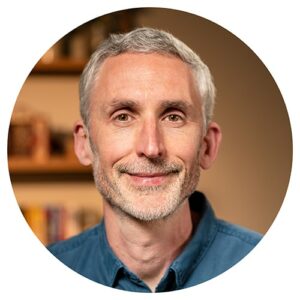
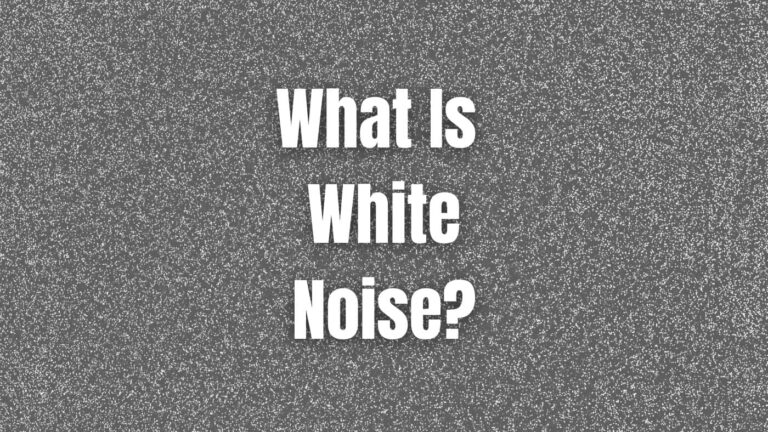
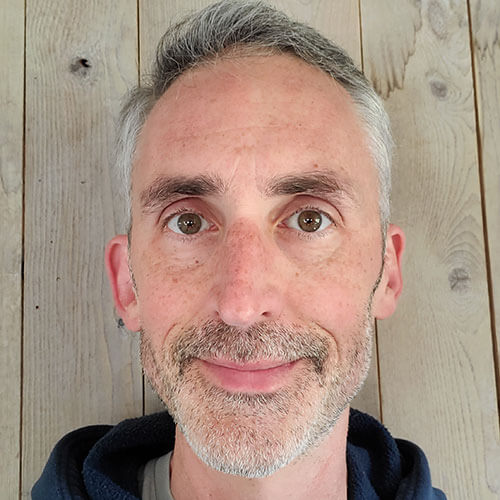
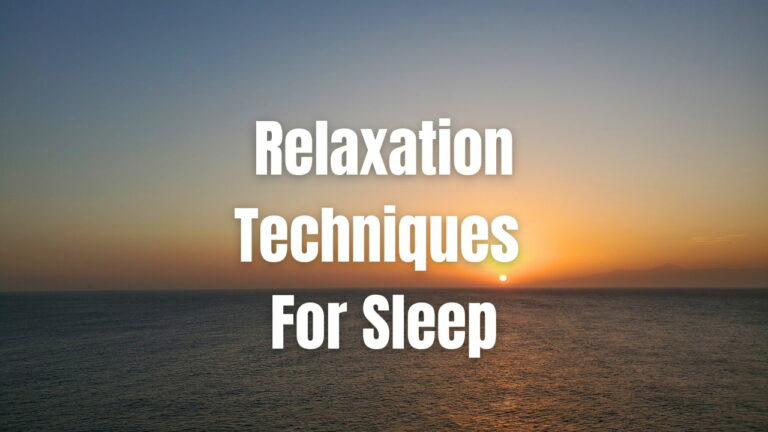
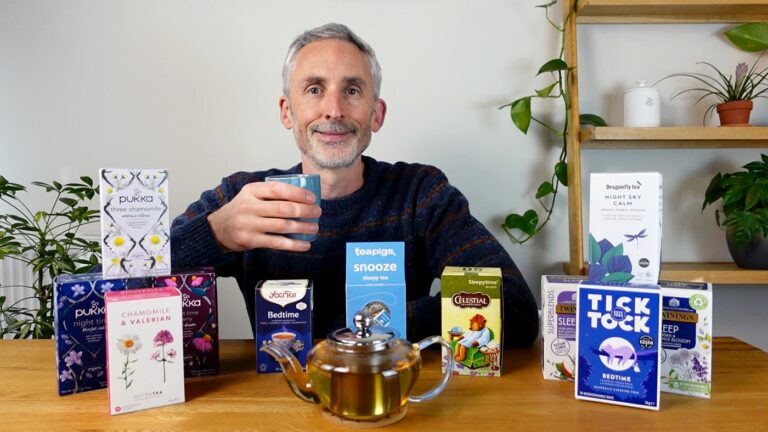
When you say that in Jul 4 to Jul 10 your average sleep was 7 hrs 25 mins, what exactly does that mean? Do you wake up at all during that sleep? How many times? I regularly sleep for 8 hours but I also regularly wake up 3 or 4 times during those 8 hours.
Hi Claire
That is the total sleep time according to my sleep tracker. Yes, I do sometimes wake up during the sleep period. In my experience of using sleep trackers for many years, there are always at least a couple of brief wakings, and sometimes longer ones. I consider that to be normal for me. As long as I get enough total sleep time, I don’t mind if I wake up briefly in the night. I’ve even learned to tolerate longer wakings by just staying relaxed about them, trying not to stress out that I’m awake at 4am and trusting that I’ll fall back to sleep.
Regards
Ethan
Just read your posts and was wondering if you lost weight after cutting out sugar and alcohol.
Hi Kim
I believe so, yes. But it’s hard to say whether it’s just because I cut them out, or because I’ve done more exercise since quitting them. I was also quite lean to start with, so didn’t have a lot to lose. But my feeling is that I’ve lost some fat and gained some muscle.
What I have noticed is that there are no longer any weekends when I overindulge and notice a sudden increase in belly fat, which I then compensate for with more exercise to try to burn off and return to my previous shape. That just doesn’t exist for me any more, and my weight and overall look seems to be quite stable.
Regards
Ethan
I wonder if the algorithm behind the sleep score automatically goes high if you get to sleep before 11 pm because this happens to me and I wonder if it awards higher marks as it were purely on the programmers’ judgement that earlier to bed, rather than say 12-9am, is best? Sometimes I don’t sleep til 2am but don’t get up til 10am or 11am and I never get into the 90s with those hours but always do if I have done 7.5+ hours sleep that started around 10:30pm ie I think it’s fixed to say get to bed earlier!
It’s a shame to see that the only real benefit was your lower resting heart rate but perhaps that’s the point: we might not notice that difference but overall our body does and we are improved in ways Fitbit doesn’t measure apart from resting heart rate…
I also think caffeine is worse than alcohol in terms of sleep disruption and so I am curious to see your next stage of experimentation/data.
Thanks for the study!
Hi Sarah
Thanks for your comment! You know, I’ve asked myself that same question many times, and have thought about ‘forcing’ myself to test the theory by trying to maintain a similar routine for a few weeks, except for trying to go to bed long before midnight for one period of time, and then later for another. I’m just not entirely confident I can make it happen!
I also think that there are many other benefits to giving up these substances that an activity/sleep tracker can’t measure. I am 100% sure about that through personal experience.
Regards
Ethan
I found this article by accident. Very timely, as I’ve made the decision to cut down on caffeine after Amazon sent me a case of decaf in error. Since I had planned to cut down then cut it out, what better time to start than when you have a case of decaf at your disposal? The reason for my actions is my sleep has been horrible the last several years. There are personal reasons that can be associated with this but I also felt the amount of caffeine I consume must also play a role. I’m hoping for great results, the sleep deprivation from last several years is wearing me down.
Hi Kristine
Thanks for your comment. Interestingly, I recently started drinking some caffeine again to see what the effect would be, and I’m certain my sleep has worsened. So I’ll be going back to the caffeine-free lifestyle I think.
Good luck with it yourself, and I hope it has a positive effect for you. Let me know!
Regards
Ethan